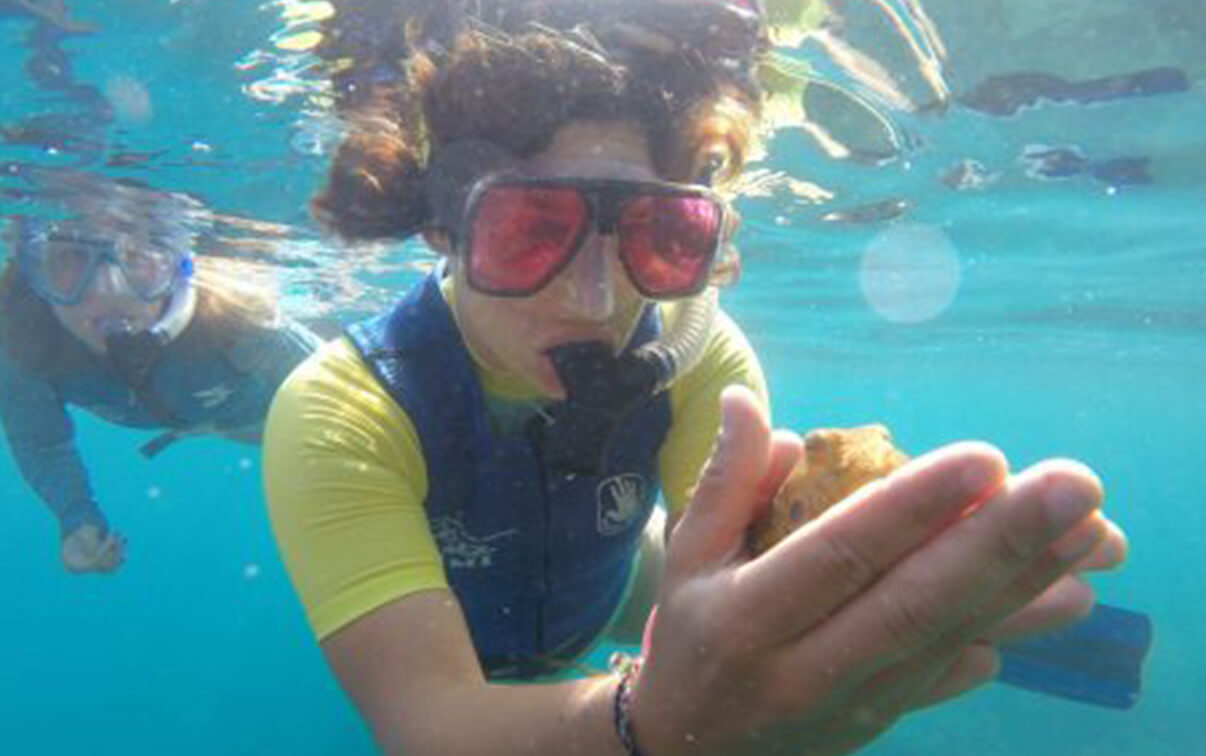
Alumni Spotlight: Katie Hackley, ‘12
The Alumni Spotlight this week shines on Katie Hackley of Avalon, California, a 2012 graduate of UMM with a degree in Marine Biology and Secondary Science Teaching Certification. a native of Connecticut, Katie is a Marine Science Instructor on Catalina Island, California.
Tell us a little about what you are doing now:
I am fortunate enough to have found a position that is a perfect marriage of my two fields of study at UMM. After working as a marine science instructor in the Florida Keys and then teaching at a middle school in Connecticut, I am now a marine science instructor at the Catalina Island Marine Institute. CIMI is run by a company called Guided Discoveries off the coast of California. In this position I am responsible for leading visiting school groups in grades 4-12 in various land and sea-based programs. Some of the lab subjects we offer include dissections, marine mammals, plankton, oceanography, fish, sharks, and fisheries awareness, just to name a few. I also have the opportunity to lead more adventure-oriented programs, like sea kayaking, snorkeling, hiking, high ropes, and rock climbing. Schools stay for either 3 or 5 days and select which programs they want to participate in, so my schedule never looks the same from week to week. The company’s purpose is to make a positive impact on the lives of children through unique experiences, and I am lucky to get to facilitate those experiences!
What is the most valuable thing you learned while at UMM?
In my time at UMM, I learned that nothing substitutes for hard work. One of the first things that my advisor Brian Beal told me before I even started classes is that As and Bs were necessary for success in the marine biology field, not Cs and Ds. He encouraged me to set the bar high for myself from the get-go. The professors at UMM have high standards, too, so getting all As and Bs is no walk in the park! Even though classes are challenging, it makes the learning experience all the more meaningful. Hard work doesn’t end when you are handed your diploma and leave UMM. The difference once you have graduated is that there isn’t such a strong support system- no office hours, no tutors or study center. Learning how to work through challenges is the best preparation you can get for life beyond UMM. Use the resources the school provides. Anything worth doing is worth working for, after all.
Do you have any advice for current students at UMM?
Find balance and use your time at UMM to figure out what you like. Participate! Work hard in your classes, but also branch out and try something new that may interest you. Pursue what you like and leave what you don’t. I started UMM as a marine biology major, and in my freshman year I signed up for an education class and decided that teaching was what I wanted to do. Try a new fitness class at the Reynold’s Center, host a radio show, or join a club or organization. Take advantage of trips and events. I learned that snowboarding was not the sport for me, but I fell in love with yoga. I wouldn’t have learned that had I not tried! UMM is special because, despite being a small school, there is so much diversity in its offerings. It also gives you the chance to meet students outside of your program of study. So get out of your room and live. You only have a few short years to do a lot, so work hard and play hard!
How did your time at UMM prepare you for what you are doing now?
The fieldwork was the best job preparation I could have gotten from both the marine biology and education programs. It is one thing to learn conceptually how to do something, but another thing to actually do it. It’s like that old saying, “tell me and I’ll forget, show me and I’ll remember, but involve me and I’ll understand.” I remember setting foot into a school to observe in my very first education class. We were loading up the vans visiting different sites for every science class, or in the lab actually using equipment. This exposure was paramount to learning, and being in the field prepared me for dealing with the elements with my school groups at CIMI. Sometimes not everything goes as planned. It may be cold, raining (or snowing!), equipment might fail, but you learn how to be flexible and problem-solve through these hands-on, authentic experiences. There is so much opportunity outside of class to work alongside professors as well. If you are studying marine biology, apply to work at the Downeast Institute. If you are in the education program, try helping out at the study center. Take advantage of these extra-curricular opportunities, it will set you apart from the rest when you go to look for jobs or apply to grad school after graduation.
How has UMM made a positive impact on your life?
Aside from subject content and hands-on experiences, UMM has given me life-long friends in and outside of my area of study. I have a network of friends across the country from my graduating class, from my involvement with the Kappa Alpha Kappa sorority, with the faculty at Washington Academy where I did my student teaching, and I still have the support of my professors even as an alum. The UMM community is just that- a community, and being part of it doesn’t end when you leave Machias. I am grateful to consider myself a member! Some of my best years were spent at UMM. The beauty of Machias is unrivalled, and there is so much to do and see. I can’t wait to come back and visit soon!
